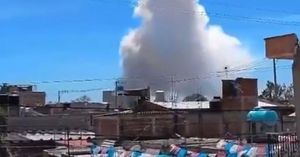Greece is currently grappling with severe winter weather, as unusually heavy snowfall has blanketed large parts of the country. On the night of April 6, 2025, temperatures in northern Greece plummeted by a staggering 20 degrees, with the city of Thessaloniki experiencing snowfall that dropped the temperature to minus two degrees by the following morning. Schools were closed, and snowplows were deployed to clear the roads as residents dealt with the unexpected cold snap.
According to reports from ERTnews, the icy conditions have forced many students to stay home due to the frigid temperatures. Farmers in the northern regions are particularly concerned about the impact of the cold on their fruit blossoms, including cherries, pears, and plums. The sudden drop in temperature has raised worries about potential damage to crops that are typically beginning to bloom at this time of year.
While the north of Greece is facing this harsh winter weather, the southern island of Crete continues to enjoy mild spring conditions, with sunny skies and only occasional showers. The contrast between the two regions highlights the diverse weather patterns that can occur across Greece, especially during transitional seasons.
The heavy snowfall has not been limited to northern Greece; it has also affected central regions, including Thessaly, Macedonia, and Thrace. Reports indicate that some mountain areas have seen snow accumulations of over one meter, leading to significant traffic disruptions and temporary power outages. Even in lower-lying areas and coastal regions, which typically experience milder winters, residents have reported snowfall.
In many regions, the situation has begun to normalize, but winter conditions are expected to persist in the mountainous areas. The Greek media has been closely monitoring the weather, as the country has already faced a tumultuous few weeks marked by both heatwaves and severe storms prior to this cold snap.
As the icy spell continues, authorities are urging residents to exercise caution while traveling and to prepare for the possibility of further disruptions. The local governments are working to ensure that roads are cleared and that essential services remain operational despite the challenging weather.
This sudden shift from warm to cold weather serves as a reminder of the unpredictable nature of climate in Greece. With the country experiencing both extremes—ranging from heatwaves to snowstorms—it raises questions about how such weather patterns will affect agriculture and daily life moving forward.
In conclusion, while northern Greece braces for continued winter weather, the southern regions remain largely unaffected, showcasing the stark differences in climate across the country. As the week progresses, residents are hopeful for a return to more stable weather patterns.





